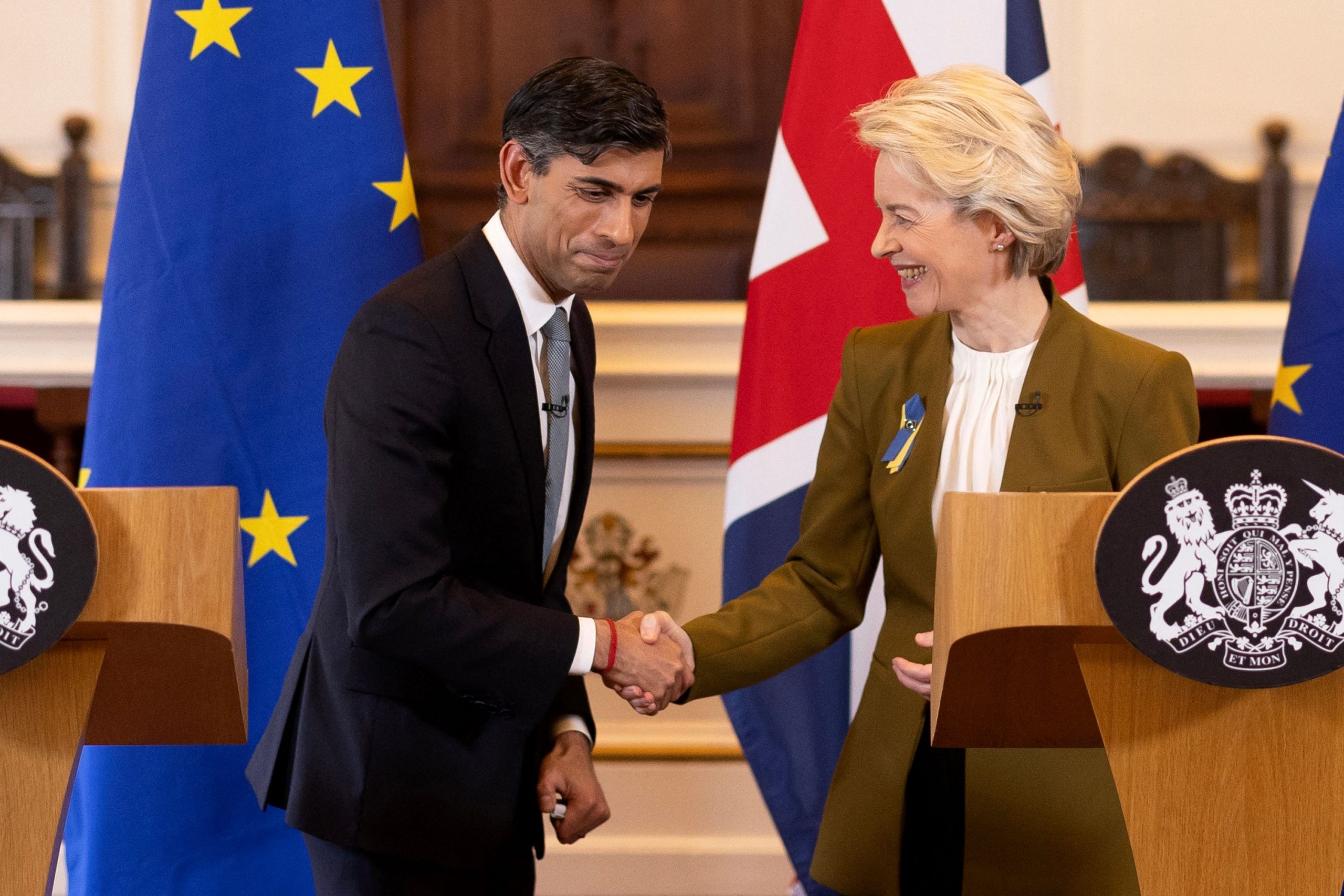- Saturday, July 27, 2024

By: Sunder Katwala, Director, British Future
RISHI SUNAK had the best day of his premiership to date on Monday (27), unveiling his renegotiated Brexit deal in Windsor. It is just over a century since the Royal proclamation of 1917 rebranded the House of Saxe-Coburg as the House of Windsor and Sunak clearly took inspiration from that historic act of Royal rebranding. The Northern Ireland protocol is no more: long live the Windsor declaration!
These Royal optics – inviting EU Commission president Ursula von der Leyen to meet the King at Windsor Castle – probably pushed at the boundaries of constitutional propriety. Ministers have a duty to protect the monarch from political controversy. This could have backfired badly had the deal been seen as all spin and no substance. Yet, the content of Sunak’s deal exceeded expectations at Westminster too.
Many felt making any deal could involve too much political risk, as former prime minister Boris Johnson signalled opposition over the weekend. Downing Street will have been glad to hear key pro-Brexit voices laud the deal – from David Davis, Andrea Leadsom and Liam Fox on the backbenches to Northern Ireland minister Steve Baker, former leader of the ERG rebels. Labour’s Keir Starmer guaranteed the prime minister the votes he would need to get the deal through, advising Sunak to break with his predecessor’s approach by being honest about the trade-offs involved.

The “Stormont Brake” is an impressive negotiating achievement. Northern Ireland’s devolved assembly has a potential veto power over future EU regulations beyond that of national parliaments of the 27 member states. Since Stormont cannot exercise its new powers if it is not sitting, it could prove an important carrot in the effort to restore the devolved institutions, currently suspended. Yet, this might not work. The DUP has said ‘no’ much more often than ‘yes’. What this deal does is give Northern Ireland a potential veto over future EU laws by accepting current EU laws – including the role of the European Court of Justice. There will be constraints to ensure the brake can only be used on issues with a major impact. And the EU can take proportionate retaliatory measures if it is applied. So, using the new control is not cost-free – because partners have sovereignty too.
The UK government has sometimes been criticised for conflating consultation in Northern Ireland with keeping the DUP happy. Yet Sunak talked about balance in the Commons – reflecting Unionist concerns about sovereignty, nationalist concerns about a hard border, and business interests in trade. It is unusual to hear a prime minister emphasising the benefits of single market access for Northern Ireland, recognising that many in Northern Ireland support “dual access” to British and Irish markets.
If Sunak’s success will strengthen his standing at Westminster, the public may be less engaged. Few voters outside Northern Ireland understand the protocol. Many people feel Brexit ‘got done’ three years ago. A growing group now disapprove of Brexit entirely. But public exhaustion with the Brexit arguments means there is a broad appetite to move on to other issues, especially the economy and the NHS.
This Windsor deal does represent a big strategic choice for the Sunak administration: that post-Brexit Britain needs pragmatic cooperation with its neighbours, friends and allies. It mutually de-escalates the UK-EU relationship, with the government dropping Johnson’s bill to dis-apply the Northern Ireland protocol, and the EU ditching its legal challenges. Sunak hopes the prize is to rapidly unlock cooperation beyond Northern Ireland. His vision of the UK as a science superpower will now be boosted if the UK can rejoin the Horizon Europe programme, putting UK-EU scientific cooperation back on track.
The Sunak cooperation strategy has consequences for the government’s efforts to get a grip on small boats crossing the Channel. “The UK is and will remain a member of the ECHR,” the prime minister said, an unqualified commitment, when Labour’s Alison McGovern asked him about its key role in Northern Ireland’s Good Friday Agreement.
This will disappoint home secretary Suella Braverman, who rarely disguises her continued disagreement with government policy about this. “There are legitimate questions we need to ask about our membership of the ECHR,” she told GB News last week. Former adviser Nick Timothy argues that the government’s latest asylum bill will fail if the UK does not leave the ECHR too – though several practical barriers also make promises to detain and deport all those who cross the Channel impossible to keep.
But leaving the ECHR would end Sunak’s new post-Brexit cooperation project before it could begin. It would be a ‘no deals’ scenario, wrecking any productive working relationships with either French president Emmanuel Macron or US president Joe Biden. With the Windsor agreement, Sunak seeks to show that cooperation can make more tangible progress than confrontation and impossible promises. The prime minister’s political capital is rising, but whether it will enable Sunak to extend his new pragmatism to the challenges of the Channel is an open question.